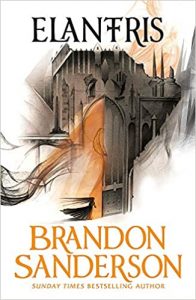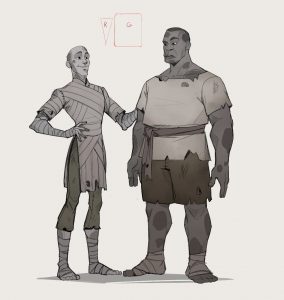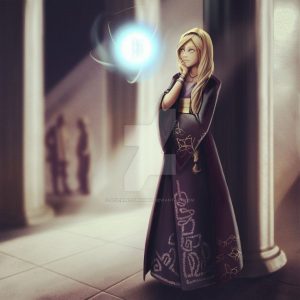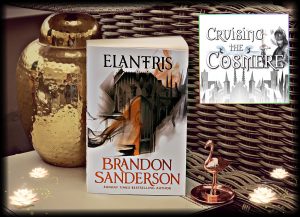CRUISING THE COSMERE: Elantris (BOOK REVIEW)
“The Elantrians represented the ultimate flaw of human arrogance. They had set themselves up as gods. Their hubris had earned them their fate.”
Elantris by Brandon Sanderson is the author’s debut novel, one that I was slightly apprehensive to read considering how much I love the Stormlight Archives series and feared this would be a huge disappointment in comparison. Whilst Elantris is clearly not as epic, fast paced, nor as intricate as Stormlight Archives, I was nevertheless amazed by how wonderful and compelling this story was. This is a novel that intimately explores the relationships between piety and righteousness, humanity and savagery, pain and peace.
 Once Elantris was the pinnacle of magnificence, the home of mighty Gods whose white hair and glowing skin radiated, it was a city of wonders and decadence, a place of healing. How the mighty fell. When the Reod, a believed curse, fell upon the citizens of Elantris eternal bliss became eternal torture and all that was beautiful crumbled and turned to filth. The Elantrians who were once worshipped became weak, grey skinned, decaying beings that were now feared and cast aside. The Shaod, the transformation process which turned those into Elantrians, once a blessing became a bane you wouldn’t wish upon your worst enemy.
Once Elantris was the pinnacle of magnificence, the home of mighty Gods whose white hair and glowing skin radiated, it was a city of wonders and decadence, a place of healing. How the mighty fell. When the Reod, a believed curse, fell upon the citizens of Elantris eternal bliss became eternal torture and all that was beautiful crumbled and turned to filth. The Elantrians who were once worshipped became weak, grey skinned, decaying beings that were now feared and cast aside. The Shaod, the transformation process which turned those into Elantrians, once a blessing became a bane you wouldn’t wish upon your worst enemy.
In the wake of the fall of Elantris the surrounding city of Arelon also began its descent into poverty and starvation. The entire kingdom became a dishevelled land, riddled with corruption and greed. This is where we meet our three main protagonists – Prince Raoden, much loved by the people of Arelon, falls victim to the Shaod and is secretly exiled to Elantris. His father, King Iadon, weaves a tale of lies and fools everyone into believing his son is dead. Princess Sarene, now believing she’s a widow, must play a bold game of politics with the nobility if she is to stop Arelon from falling into the hands of the Fjordell empire. Lastly, Hrathen, a priest of the Shu-Dereth religion from Fjordell, enters Arelon on a single purpose, to convert the heretic citizens before matters are taken out of his hands and a bloodshed ensues. All three of these characters’ fates are intertwined and discovering the secrets of Elantris may be the only key to salvation.
I’ve come to regard Sanderson as a master of creating nuanced characters, ones who instantly draw you into their journey. At the beginning of Elantris our young Raoden does precisely this. From very early on we discover that Raoden is a practical character, he isn’t one to wallow in self pity or easily give in to despair, he sees the resources laid before him and works relentlessly to make life better, even in a place as bleak as Elantris. The city may be a destitute place, a place covered in slime and disintegrating buildings, but Raoden doesn’t believe they should live in squalor. He is the kind of character who gives hope to others when all hope seems lost and for that he was instantly a character I cherished.
“He knew he had to keep moving—for if he stopped, he feared he’d simply give up. The Shaod had taken his body. He couldn’t let it take his mind as well.
So, using his pride like a shield against despair, dejection and—most important—self pity, Raoden raised his head to stare damnation in the eyes.”
Through the citizens of Elantris Sanderson fascinatingly explores how the mind returns to a feral state when hope, ambition, and purpose are taken away. Elantrians are only seen as monsters because they are left to fester as such. When Raoden shows them a different way of life they quickly learn that they have the capability of being almost as human as they once were. They were even capable of forming close friendships as Galladon and Raoden adoringly demonstrate. Yet a recurring theme of Sanderson’s is to create characters who are incredibly good at helping others, but fail to be able to help themselves. They focus so much on others’ pain, they ignore their own until it becomes unbearable. Kaladin from the Stormlight Archives was very much this way inclined, and so too is Raoden. I feel this is what makes Sanderson’s characters remarkably realistic and therefore so relatable to us. How many times have we found it easier to give advice or support to others but struggle to accept it ourselves?

Raoden and Galladon fan art by Jessi Ochse. (Twitter: @JessiOchse)
We then meet Sarene, who I found to be such a wonderfully assertive female protagonist. She is the very definition of a female character who doesn’t need to define her strength through being ‘kickass’ or snarky or even physically stronger than others, she displays pure strength in her determination to use her intellectual knowledge of politics, her skills in manipulation and her wit, and applying them to push against the sexism placed on her gender. For example with King Iadon, her surly father in-law, she begins by appearing unintelligent which wins her small amounts of freedom within the castle, but when the need arises she quickly drops the façade and proceeds to manipulate him in the most satisfying ways. Then we see such a beautiful relationship between Sarene and her father, King Eventeo of Teod. These were scenes which put a smile upon my face, seeing true affection and love showed us that Sarene isn’t a cold hearted manipulator but a woman who actually cares. She’s also a character who never feels accepted, never truly believes that she has friends, people who will accept and love her. I appreciate Sanderson continuously creating female characters who show strength in a multitude of ways, and also isn’t afraid to show their vulnerabilities.

Sarene and Ashe fan art by Séverine Dumagny
In contrast, Hrathen was a character I had mixed feelings about throughout but I believe this was Sanderson’s intention. Religion plays a key role throughout Elantris as each of the lands are being invaded by Fjordell and forcefully converted to the Shu-Dereth religion. At first I viewed Hrathen as the villain of the story, a tyrant who believed his religion was superior above all. Whilst in some respects he is exactly this, I eventually came to see he is just desperately clinging onto a faith in which he had once depended on but now was beginning to lose, to question. Underneath the layers of piety Hrathen significantly struggles to forgive himself for the bloodshed he caused in the past. He’s a character who by the end I viewed in a completely different light, I went from utterly loathing to pitying him. I love the way Sanderson scrutinises the fragile line between being a zealot and having true faith.
“The church taught of the blessings of unity; it was ironic that the only people who practiced such ideals were those who had been damned.”
I have said that Elantris is a slow burn read, and whilst at times I did wish for the plot to develop quicker, for a little more action, there was still enough mystery to decipher to hold my intrigue throughout. Sanderson once again delivers a superb magic system, full of complexities and consequences. We first encounter Seons which crudely put, are balls of sentient light which act as companions. Of course there’s more depth to it than that, for example Seons are creations from old Elantris magic and they can be used to communicate long distance. We then delve into the concept of Aons – runes that can be drawn, and AonDor, which is the life force of an Aon. Much of this magic has been lost in the fall of Elantris, and as Raoden embarks on uncovering the secrets behind the magic, it became such an immensely compelling factor.
The ending of Elantris had to be my most favourite part of the novel. As the iconic Sanderlanch, the moment where all hell breaks loose, ensued my heart raced in discovering the fates of our characters. I’m happy to say for once Sanderson left me with a smile on my face rather than a feeling of complete devastation!


I’m honestly curious how this piece of the Cosmere might develop. I believe Sanderson does have a book 2 planned at some point. He’s come such a long way since he published this particular book. I do wonder if, as his first book, Sanderson held back just a little with Elantris and if that will open up more whenever book 2 might appear.
I preferred Elantris to Mistborn (runs for cover).
That’s an interesting thought Al!! I don’t think I’ve heard anyone say that before… I’ll have to judge myself after I read Mistborn!!